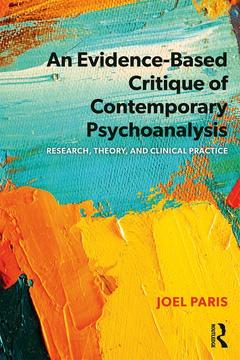An Evidence-Based Critique of Contemporary Psychoanalysis Research, Theory, and Clinical Practice Psychological Issues Series
Auteur : Paris Joel

An Evidence-Based Critique of Contemporary Psychoanalysis assesses the state of psychoanalysis in the 21st century. Joel Paris examines areas where analysis needs to develop a stronger scientific and clinical base, and to integrate its ideas with modern clinical psychology and psychiatry.
While psychoanalysis has declined as an independent discipline, it continues to play a major role in clinical thought. Paris explores the extent to which analysis has gained support from recent empirical research. He argues that it could revive its influence by establishing a stronger relationship to science, whilst looking at the state of current research. For clinical applications, he suggests while convincing evidence is lacking to support long-term treatment, brief psychoanalytic therapy, lasting for a few months, has been shown to be relatively effective for common mental disorders. For theory, Paris reviews changes in the psychoanalytic paradigm, most particularly the shift from a theory based largely on intrapsychic mechanisms to the more interpersonal approach of attachment theory. He also reviews the interfaces between psychoanalysis and other disciplines, ranging from "neuropsychoanalysis" to the incorporation of analytic theory into post-modern models popular in the humanities.
An Evidence-Based Critique of Contemporary Psychoanalysis concludes by examining the legacy of psychoanalysis and making recommendations for integration into broader psychological theory and psychotherapy. It will be of great interest to psychoanalysts, psychoanalytic psychotherapists, and scholars and practitioners across the mental health professions interested in the future and influence of the field.
Introduction
Part I : Psychoanalysis and Science
Chapter 1: Psychoanalysis in Decline
Chapter 2: Reconciling Psychoanalysis with Research
Chapter 3: Changing the Paradigm
Chapter 4: The Road to Integration
Chapter 5: Making Treatment Brief and Accessible
Part II: The Boundaries of Psychoanalysis
Chapter 6: Psychoanalysis and Neuroscience
Chapter 7: Nature Nurture, and Psychoanalysis
Chapter 8: Psychoanalysis Beyond the Clinic
Chapter 9: Belief, Doubt, and Science
Chapter 10: The Legacy of Psychoanalysis
Joel Paris is Emeritus Professor of Psychiatry and a former Department Chair at McGill University, Montreal, Canada. His research interest is in borderline personality disorder and he is author of over 200 peer-reviewed articles, more than 20 books, and over 50 book chapters.
Date de parution : 01-2019
15.6x23.4 cm
Disponible chez l'éditeur (délai d'approvisionnement : 14 jours).
Prix indicatif 46,39 €
Ajouter au panierDate de parution : 01-2019
15.6x23.4 cm
Disponible chez l'éditeur (délai d'approvisionnement : 14 jours).
Prix indicatif 160,25 €
Ajouter au panierThèmes d’An Evidence-Based Critique of Contemporary Psychoanalysis :
Mots-clés :
CBT; Psychoanalysis; Borderline Personality Disorder; integration; Clinical Practice; evidence-based; Psychodynamic Therapy; Freud; Gene Environment Interactions; contemporary; Chronic; clinical; Classical Psychoanalysis; theoretical; Cognitive Behaviour Therapy; Joel Paris; Follow; attachment; Held; psychotherapy; Psychotherapy Integration; neuroscience; Evidence Based Practice; humanities; Psychological Science; psychological treatment; Academic Psychiatry; intrapsychic mechanisms; Great Divide; psychoanalytic therapy; Freud’s Original Ideas; neuropsychoanalysis; Standard Social Science Model; modern clinical psychology; Nature Nurture Problem; Attachment Model; Long Term Therapy; Short Term Dynamic Therapy; Short Term Psychodynamic Psychotherapy; Recovered Memory Movement; DBT; American Psychiatric Association



